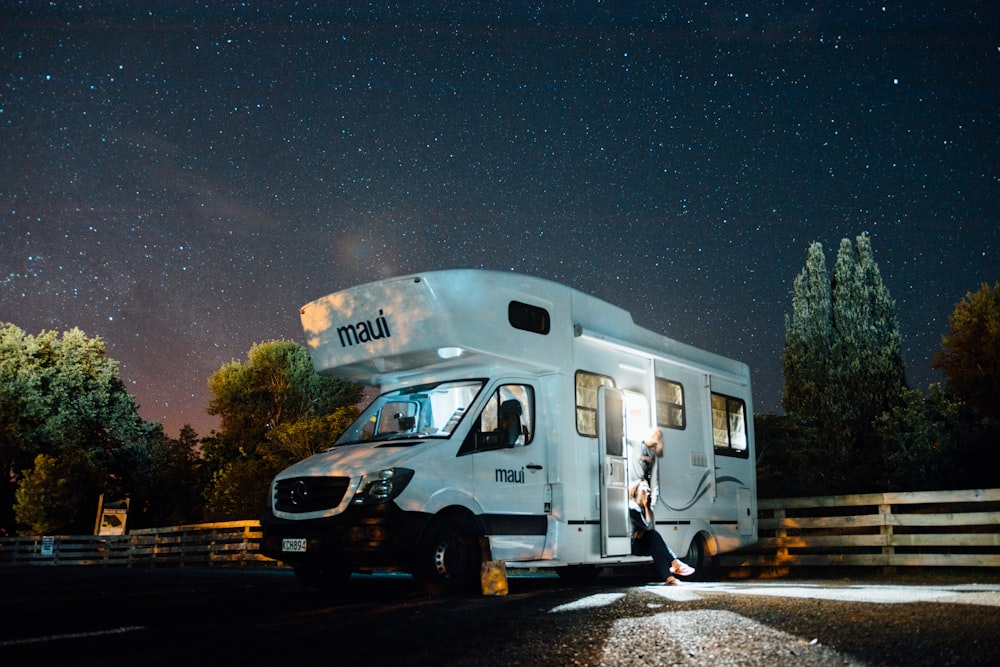RVing is about unplugging and getting out in nature. But that doesn’t always mean that we want to completely disconnect from the outside world. For many, it’s important to stay connected to the internet while on the road. Whether you need to be online for work, communication with friends and family, or planning the next leg of your journey, having access to the World Wide Web is oftentimes a must in today’s world. Here at Outdoorsy, we’re often asked, “What is the best internet service for an RV?” The answer isn’t always straightforward, but in this article, we’ll break down the best RV internet options out there.
IN THIS ARTICLE
- Calculating your data usage while RVing
- How to get internet while RVing
- Tips and tricks for using the internet on the road
Calculating your data usage
Before narrowing down what type of RV internet service is best for you, think about how and where you use the internet while traveling.
Data usage
Many mobile internet services charge according to your data allowance plan. The amount of data dictates how long you can use the internet for and for what types of activities, as certain tasks online use up more data than others. For instance, streaming a TV show on Netflix eats through a great deal more data than looking up a recipe or checking your email. Video streaming also typically needs a stronger, more consistent connection than browsing mostly-text webpages.
Consider how frequently you use the internet. Do you mainly use it for navigation and to look up your next RV park or are you a digital nomad that spends several hours a day online for work? How often you’re using the web also has a major impact on how much data you use.
To get an idea of how much data you might go through, check out a data calculator online like this one from Verizon.
Location
The second consideration to think about is the types of locations that you plan on traveling to. Are you one to go boondocking far off the beaten path or do you prefer to stay closer to civilization in RV parks? This will be a factor in what services are available to you.
How to get internet while RVing
There are four main options that RVers have for internet on the road:
- Cellular
- Satellite
- WiFi
- Cable Internet
What might be the best internet service for RVers in one scenario might not be a good option for another. Each comes with its own set of advantages and disadvantages. Let’s take a look at each of these and help you figure out which may be best for you and your RV.
RV internet option one: Cellular
Cellular internet uses the same technology as your smartphone’s internet service to connect other devices to the web. If you get good reception, speeds are typically fast enough for HD video streaming.
Mobile hotspot
Using cellular data can be as easy as simply turning on the mobile hotspot feature on your phone. This feature is built into many plans, meaning you don’t need to purchase any additional equipment or pay extra. Just remember that whatever data you use on other tethered devices will count towards your monthly phone data allowance.
Always be sure to check with your cell phone provider for their mobile hotspot rules.
Jetpacks and mobile hotspot devices
Some carriers go beyond mobile hotspots on phones and offer separate hotspot devices. These are small units that use cellular data to connect devices to the internet via WiFi. You connect to the internet just as you would connect to your WiFi network at home. Separate mobile hotspot devices and the service are not included in your typical phone plan. This service will need to be added on.
Cellular internet for RV costs
Utilizing your phone’s existing hotspot may not cost anything extra, provided that you stay within your data allowance. For plans with hotspot devices, carriers may charge anywhere from $35/mo to over $100/mo, depending on your data allowance. You may also need to purchase the device itself separately upfront.
Pros and cons of cellular internet for RVs
The biggest advantage of cellular internet is the quality and ease of use. Mobile hotspots are easy to set up, and you can use your existing cell phone provider who will roll it all into one bill. When you do get service, it’s typically fast and reliable. It’s also the most portable internet option, meaning you can take your device with you anywhere— even on the trail!
On the downside, you will not get service everywhere. If your phone doesn’t have reception, neither will your cellular hotspot. A little research ahead of time will often tell you whether or not a carrier gets reception at a place you want to go.
Be wary of cell providers’ “unlimited data” claims. While you do technically have access to unlimited data, speeds are typically slowed down after you hit 15 GB or 30 GB. The slower speeds are often not enough to stream video, so you still want to use the web sparingly on these plans.
Who cellular internet is best for
Cellular internet is best for those who are sure there will be reception at the places they’ll be camping and don’t plan on doing a lot of streaming. This is a great option for digital nomads and those working from their RV.
 RV internet option two: Satellite
RV internet option two: Satellite
You’ve probably seen RVs parked at a campground that has satellite dishes mounted on the top. These are for satellite TV or internet. Both technologies require the dish, which sends and receives signals to a satellite in space.
Satellite internet costs
Satellite internet service typically costs $50/mo-$150/mo, depending on your provider and plan. A dish can cost anywhere between a few hundred dollars to $5,000.
Satellite internet advantages and disadvantages
Satellite is great because you’ll get service where no one else does. Because it relies on a satellite in the sky and not a tower with limited range, you can pick up signal just about anywhere.
On the downside, conditions have to be just right. The dish has to have an unobstructed, clear view of the Southern sky. This is tricky when you’re camping in a forest. And even if you do get service everywhere, it isn’t always fast. Satellite is also the priciest option with the most expensive equipment.
Who satellite is best for
Satellite internet is best for those who plan on frequenting rural areas with little cell reception.
RV internet option three: RV WiFi
The next option is WiFi. These are networks that you’ll find at RV parks, rest stops, and other public locations.
WiFi costs
Unless you are subscribing to a network of WiFi hotspots, you don’t need to worry about signing up or paying another bill monthly. You can find free RV WiFi options along your journey at many RV parks and public locations such as coffee shops and libraries.
WiFi advantages and disadvantages
The biggest advantage of RV WiFi is that it is easy and cheap. Simply sign in to the WiFi network, and you’re connected.
The downside is that you need to be at a place that offers WiFi. Though many RV parks offer this nowadays, it certainly isn’t standard. You also need to be close to a router or purchase a signal booster. Walking a few steps away from the RV park can leave you disconnected. Additionally, the connection may not be great, especially in the afternoons and at night when everyone is trying to get online. It is the most unreliable option, but great for those on a budget who don’t really plan on using the internet too much on the road.
Who WiFi is best for
WiFi is the best option for those who don’t plan on needing an internet connection at all times wherever they go.

The occasional option: Cable internet
You might come across some parks that offer cable or DSL internet. This type of internet is wired using telephone lines or fiber optic cable and is what you’ll find in most households. Because you need the physical cable, it is not available in too many places.
Cable internet costs
A subscription to a cable provider is typically between $50/mo-$100/mo, plus any equipment that you need to purchase, such as a modem or router.
Cable internet advantages and disadvantages
Cable internet is the fastest and most reliable option. There are usually no data limits, meaning you could stream Netflix all day if you wanted to! However, it’s only available if there’s a cable connection, meaning you can’t take it with you wherever you go. Many RV parks do not offer cable internet.
Who cable internet is best for
Cable internet is great and reliable if you’re staying at a park that offers it long-term, making it the best internet for RV living.
Tips and tricks for using internet on the road
Here are a few things to keep in mind if you want internet for RV living.
- Get specific with your planning and research: This RV internet guide is designed to be a broad overview starting point. When determining which RV internet services and provider are best for you, always get specific with your research. Check coverage maps to see what companies cover where you’re going. Look online at RV and camping forums to learn about the best options for your location and type of camping. Chances are, you’ll find seasoned RVers who have the answers you’re looking for.
- Plan your usage: For some internet options, dead spots will be unavoidable. You can, however, plan ahead of time and download things like maps and entertainment on your devices when you do have service.
- Let others know of your itinerary: This is good practice anytime, but it is especially important when you are heading to a place where you might not have phone or internet service. Always let a friend or family member know where you plan on going. This can be a life saver if you get in an accident or get lost.
- Know your other options: People were RVing long before the internet. Don’t forget your oldie but goodie options— break out your map for navigation (make sure it’s up-to-date, though!) and some cards, board games, and DVDs for entertainment.
Get connected
Going on an RV trip doesn’t mean having to give up your internet connection. Whether you’re venturing across the country or just a few miles down the road, know that you have options.









